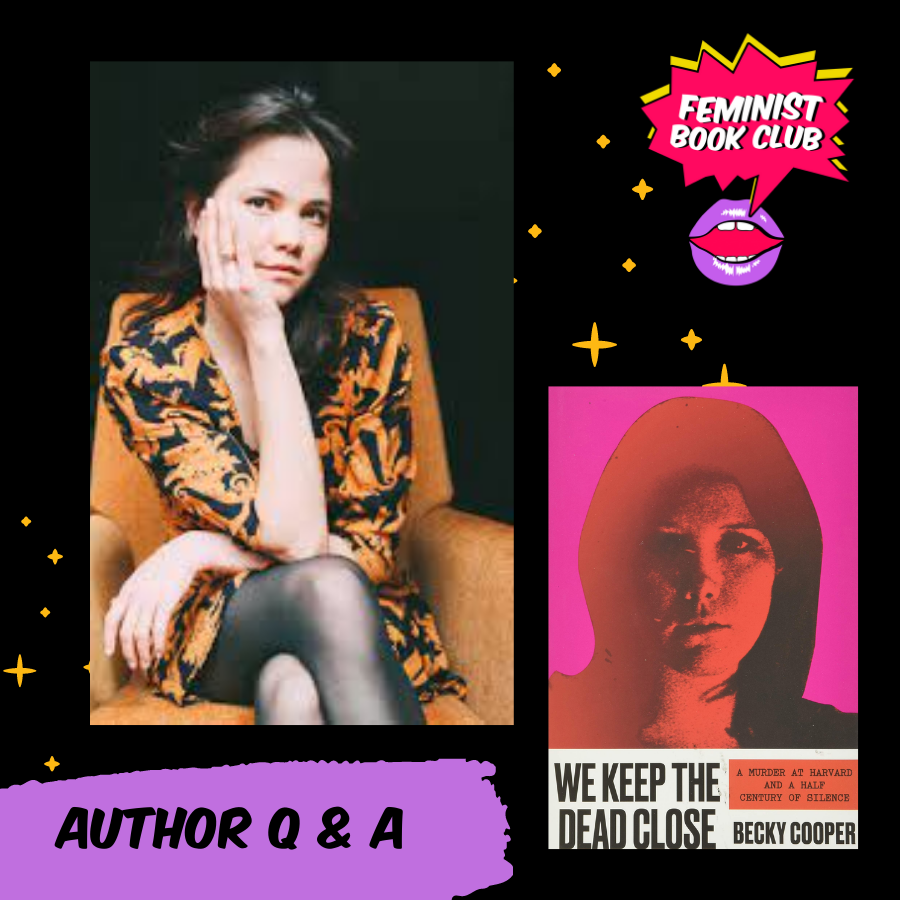Can true crime be feminist?
This big question kicked off the night we chatted with Becky Cooper, author of We Keep the Dead Close. Despite the time difference between the US and the UK, she answered FBC member questions on Tuesday October 26th.
In her book, Cooper details her extensive investigation into the mystery surrounding Jane Britton’s death at Harvard in 1969. She encountered the silence around Jane during college, and it became her main focus for years. Jane was murdered in her apartment in January 1969, and the killer went unknown for decades. As soon as she started digging, Cooper discovered that Jane’s story tied in to the broader silencing of people in institutions not built for them.
During the Zoom discussion Cooper noted that she does not consume true crime, so it was very interesting to hear her thinking behind this book considered part of the genre. FBC members brought thoughtful questions to the chat, some of which I will share here.
FBC: What does it mean to you to be feminist?
Becky Cooper: To me it’s not having a sort of hesitation about the necessity of the equality of genders. You know, it isn’t a “women are the best.” To me it’s like there isn’t a moment to think that we can’t all do all the jobs, that our experience is as valid and necessary.
FBC: From an anthropological standpoint, what do you think the myth of disappeared or murdered coeds attempts to do? Does it merely serve as a warning, or instead does it serve to keep women in their place so they behave?
BC: I think it’s absolutely both. I think there’s a moment in the book where I suddenly realized that what I had thought was this very empowering myth or at least this myth where women are warning other women and trying to take care of eachother is the kind of flipside of that, which is the warning of what happens when women transgress… I think it is on the one hand functioning as a very acute example of a whisper network, having turned into kind of a myth of proportions that don’t pertain necessarily at all to the the characters involved, the people involved. But at the same time, it’s not just this empowering myth to protect us from external forces. It’s also to protect us from ourselves. It’s a warning to be quiet and it’s a silencing of its own.
FBC: Can true crime be feminist? And, is this feminist true crime that you’ve written?
BC:I hope so. I tried to have it be ethical true crime without intentionally seeking to put something in that genre. And I think, you know, having started out on the book, I was intrigued by Jane’s story first and foremost, because I think it told a story, as I write in the book about Harvard, that I recognized a kind of villainy that its omnipotent power might have, that there was another side to its ability to offer so many opportunities. And along the way to investigating that larger story that drew me to Jane’s murder, there’s that moment where I’m meeting with Eva Houston in the cafe in Midtown, and she says to me, “I think this is a story that’s symptomatic of a disease that we don’t want to admit that we have.” For so much of working on Jane’s story, I found it kind of hard to justify why I was spending so much time on one particular woman’s murder, when the resources of my own, but also the resources of the police departments that reactivated the case, could be spent looking at so many other crimes. But I think for me at that moment that Eva Houston said that, and the story really opened up to me to be a kind of allegory of the way that power works in academia, where it’s, you know, the silencing of women and people of other marginalized communities and academia finally had an outlet possibly for their experience, within the walls of Harvard and academia more broadly. I saw that, you know, I wasn’t just talking about one woman silencing on that particular night, but I was talking about a much broader silencing happening. To this day, not just in 1969 in academia.
On writing true crime:
BC: I was talking to one person who really loves true crime books and they were asking how it came to my mind to include so much of Jane and I was taken aback because it just never occurred to me to not. It’s not a story about her death. It’s a story about who she is, and it’s in addition to the larger story about power and institutional oppression. It’s a story about a girl that I fell in love with and how do I not spend every page that I can like just quoting her letters that are smarter and funnier than anything I could write. So it really means a lot that she’s come through to you and that it doesn’t read like a conventional true crime story.
If you’re interested in true crime, you must read Steph’s piece, and listen to Mariquita and Natalia’s podcast episode.

